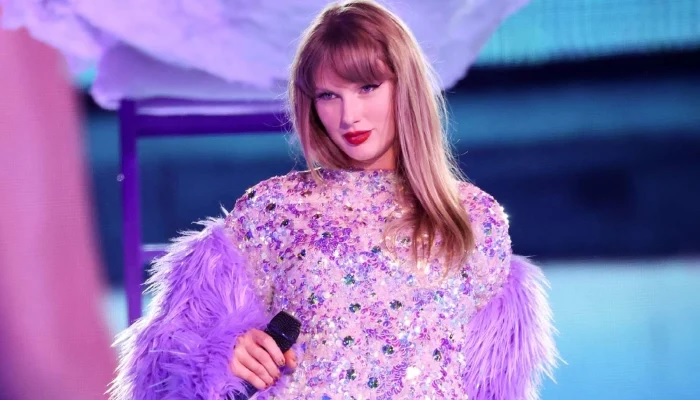Taylor Swift Fans Unleash Fury on Cam Stewart After Niagara Falls Comment Sparks Outrage

In the age of social media, where the smallest comments can ignite massive backlash, Cam Stewart’s attempt at humor has landed him in hot water.
The host of the Drew & Stew Podcast recently made incendiary remarks about pop sensation Taylor Swift, particularly taking aim at her appearances at Kansas City Chiefs games due to her highly publicized relationship with Chiefs tight end Travis Kelce.
Stewart’s comments have sparked a fierce response from Swift’s devoted fanbase, known as the “Swifties,” who are now demanding accountability and, in some cases, an apology.
On his podcast, Stewart initially vented his frustration with the Kansas City Chiefs, a team he feels has been unfairly favored in recent NFL decisions.
“Honest to God, Kansas City fans, it’s not personal… I hate your team, and I hate the way they’re getting benefits from the NFL,” he fumed, referencing what he believes are instances of favorable treatment for the Chiefs.
The team, led by star quarterback Patrick Mahomes, has been a dominating force in the NFL, and Stewart’s frustration likely resonates with fans of rival teams.
But Stewart’s commentary didn’t end with sports. His rant took an unexpected twist when the subject of Taylor Swift’s attendance at Chiefs games arose.
The pop star has been seen cheering on Kelce alongside his family, creating a media frenzy that extends well beyond the usual bounds of sports news.
Stewart’s reaction to the possibility of Swift’s attendance at an upcoming game was swift and biting: “Oh, who cares? Throw her into the Niagara Falls.” It was this comment, laced with frustration and an attempt at humor, that ignited widespread backlash.
Stewart’s remark instantly caught the attention of Swift’s fans, who are famously protective of the singer and fiercely loyal.
Swifties took to social media to voice their outrage, denouncing Stewart’s comment as both inappropriate and offensive.
For fans, his words crossed a line; regardless of his personal grievances with the Chiefs, dragging Swift into the mix and making light of harm was unacceptable to them.
Across platforms like Twitter and Instagram, Swifties banded together to express their displeasure.
Some called Stewart’s comments “dangerous” and “irresponsible,” warning that, as a public figure, he should know better than to make light of violence or harm, even in jest.
Others took a more critical stance, accusing Stewart of using Swift’s name to gain attention for his podcast, as Swift’s appearances at NFL games have brought massive viewership and engagement.
One fan on Twitter wrote, “Joking about throwing someone into Niagara Falls? Really? This is not comedy. It’s tasteless and immature.”
Another echoed the sentiment, saying, “If you can’t handle a bit of pop culture overlap in sports, maybe you shouldn’t be in the commentary game at all.”
The backlash has put Stewart in a challenging position. Though he attempted to downplay the comment as a joke gone awry, the Swifties’ response has shown that his words are not so easily dismissed.
In the age of internet fandoms, particularly one as powerful and organized as the Swifties, a single comment can carry consequences far beyond its original context.
Taylor Swift is not just a pop star; she is a cultural powerhouse with a fanbase that spans generations and transcends traditional demographics.
Her fans are known for their loyalty and dedication, often mobilizing on social media to defend Swift’s honor and call out those they perceive as harmful to her.
Whether Swift addresses her fans’ concerns or not, the Swiftie community operates with a degree of independence and intensity that makes it a force to be reckoned with.
In recent years, the Swiftie fandom has proven its power by impacting real-world outcomes. From influencing voting initiatives to rallying for artist rights, Swifties have shown they can turn social media outrage into organized action.
Their loyalty extends not just to Swift’s music but to her values, and when someone crosses what they perceive as a line, they respond swiftly and decisively.
After the backlash began, Stewart attempted to address the incident by clarifying that his comment was intended as humor, not malice.
Read More: Kate Middleton Fuels New Wave of Tension with Meghan Markle
However, his attempts at damage control have been met with skepticism. For many Swifties, the fact that he would joke about harm coming to Swift reveals a lack of respect for her and her fanbase.
Some argue that such “jokes” reflect underlying attitudes, and in this case, they feel Stewart’s remarks suggest an underlying hostility toward Swift and the attention she brings to the NFL.
To date, Swift herself has not commented on the situation. Known for her restraint and focus on her career, Swift rarely engages with negative commentary, preferring to let her fans, reputation, and music speak for her.
However, her silence has done little to quell the outrage of her fans, who continue to demand a more substantial response from Stewart.
Some are calling for a formal apology, while others have suggested boycotting Stewart’s podcast.
The incident highlights a recurring tension in sports culture: the overlap with celebrity and entertainment.
For some sports purists, the recent media attention on Swift’s attendance at NFL games, particularly Chiefs games, has been a distraction.
While Kelce’s relationship with Swift has undoubtedly brought increased viewership and new fans to NFL games, it has also triggered a backlash from those who feel the focus should remain on the sport itself.
This criticism, however, often overlooks the positive impact of celebrity involvement in sports. Swift’s attendance has brought new audiences to the NFL, including fans who might not have otherwise tuned in.
Her involvement has spurred excitement and created crossover moments that appeal to both sports and pop culture fans.
In the end, Stewart’s comments reflect a tension that exists not just in sports but in society at large: the way we perceive and react to celebrity, and the responsibilities that come with public commentary.
For Stewart, the backlash serves as a reminder that even offhand remarks can have serious consequences, especially when they involve high-profile figures like Taylor Swift.
And for Swifties, it’s another moment to stand behind their idol and assert their collective power.
As this story continues to unfold, it remains to be seen whether Stewart will issue a more formal apology or whether this will simply be another example of internet outrage passing with time.
However, one thing is clear: the Swifties are a force that public figures would do well to respect.





